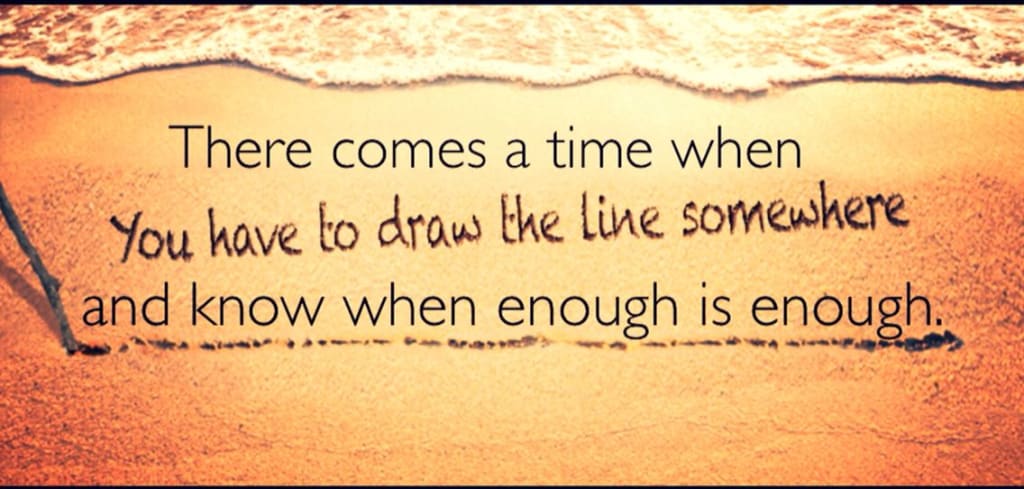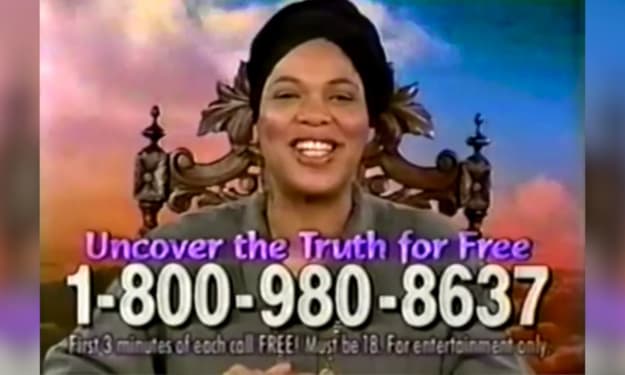4 Important Ways to Create Boundaries with Family Members
You have to draw the line somewhere

Do you struggle with making your own decisions out of fear of what your parents or family may think? Do you lack confidence in your ability to assert yourself when family members overstep their boundaries? Does the idea of keeping certain family members (including parental figures) at a distance for the sake of your emotional wellbeing give you anxiety?
Take a moment to ponder upon these questions before reading this article.
Setting appropriate boundaries with family can pose to be a challenge, especially if you are an individual who struggles with being assertive. However, according Dr. Seth J. Gillihan’s article: 5 Benefits of Asserting Your Needs—and How to Start Today, there are many benefits to being more assertive:
•Less anxiety
•Less depression
•Greater self-esteem
•Greater sense of agency
•Better relationships
Granted, in most cases, our family wants what they feel is best for us. Although their intensions may be in the right place, it is still important to know how to respectfully assert yourself when a family member crosses the line with you, that also includes the authority figures in your family unit. The purpose of this article is to help you do that.
1. “I appreciate your concern, however I don’t want your advice”
We all have 1-2 family members (maybe even more), that love to offer unwarranted advice. Perhaps they may not agree with the choices that we may make concerning: careers, dating, sexuality, child rearing, religion, and/or health. Sometimes it’s easy for us to rationalize and tell ourselves: “this person just wants what is best for me”. This isn’t entirely true. This person wants what they feel is best for you, there’s a difference.
Does their advice align with your personal values? Does it resonate with what you want for yourself? Do you know what is that you want exactly? Do you have confidence in your decision making skills? Here’s an even more imperative question: what are your core values?
According to Meg Sleig’s article: 6 Ways to Discover and Choose Your Core Values, knowing your values gives you an understanding of who you are, who you want to be and it also provides a guideline for your actions. Another read that I recommend written by the same author is: 9 Surprising Superpowers of Knowing Your Core Values.
What is important to be noted, is that knowing your core values helps you to confidently live in your truth.
When you know who you are, what you want and why you want what you want, when faced with family members who try to force their personal value systems on you, you’ll be ready to stand your ground and defend the things that you believe in.
You don’t have to accept unsolicited advice, especially if it is misaligned with your personal value system.
2. “What you said/did offended me”
Do you have a hard time speaking up when a loved one hurts your feelings? There may be certain family members that you feel you can’t be vulnerable with because you don’t want to be labelled as being “too sensitive”.
“Society has taught us that being "emotional" or "sensitive" is a bad thing when in reality it's a hidden superpower that–if used correctly–can bring us closer to other people.”
-How Do I Tell Someone They've Hurt My Feelings?, Mariana Plata, The Gen Y Psy.
You can choose the route of avoidance, but ultimately, that will make things worse. Maybe you’re afraid of confrontation. Maybe you’re fearful of how the other party may react or that confronting the situation may elicit negative feelings.
You’re not responsible for how that person chooses to respond, but you are responsible for being your own advocate.
As Dan Mager mentioned in his article: How to Have Difficult Conversations, planning and preparation is key. Try to have those tough conversations as soon as issues arise. Agree on a mutual time and place to talk, so that will give you some time to gather your thoughts. However, what you don’t want to do is allow the issue to fester for weeks, months and years.
The truth is, we teach people how to treat us based on behaviors and actions we choose to accept from others. Silence and indifference is acceptance.
Working to improve your self-worthiness will help you with confidently speaking up on your own behalf.
3. It’s ok to keep your family at a distance
So let’s say that you had those difficult conversations, and you’ve had them on multiple occasions for the same reasons and nothing has changed… If you feel that it is best to put some distance between you and your family, do what you need to do.
Estrangement is never a pleasant process, but there are some cases when it is necessary.
“We’re conditioned to think that relatives deserve a free pass, which means we often put up with behavior we wouldn’t put up with from others. Behavior that’s demeaning, demoralizing, and despicable. But if you wouldn’t allow yourself to be treated poorly by others, does it make sense to let your relatives treat you poorly? If you wouldn’t put up with hateful values and toxic dynamics with friends or peers, why does family get a pass?”
-When Not Going Home for the Holidays Is the Best Gift to Yourself, Alexis Dent.
You may be faced with the challenge of prioritizing your mental and emotional wellbeing over familial ties. As painful and traumatizing that decision is, understand that you deserve to have your boundaries honored, and you deserve to be loved and respected for who you are. Most importantly, you deserve to be in spaces where you feel comfortable and safe. If that means keeping your interactions with your family at a minimum, that is totally fine, and there’s no reason to feel guilty about honoring yourself.
Taking some tidbits from Seth Meyer’s article: Estranged From Your Parents Or Siblings: An Overview, there are ways to make this process less messy and less painful.
Communicate with your family and explain to them why you feel time and space from them is necessary. Then initiate measured contact first. Measured contact is planning out when and how long you intend on interacting or distancing yourself from your family.
So let’s say you normally visit your family in-person every 2 weeks, if you want to initiate measured contact, decide whether or not you want to lengthen the time between in-person visits, if you’ll be using other modes of communication in the meantime, and whether or not you want to shorten your visits. For example, if your visits with your family normally last for 5 hours, but you find yourself being totally drained afterwards, you may decide that 2 hour visits every 1-2 months is your personal threshold, and that’s perfectly ok.
Your intuition and what you feel is best for you will ultimately be the guide. If all else fails, full-blown estrangement may be the next step. A read that I recommend to help with this process even more is: 8 Signs It's Time To Cut Ties With A Toxic Family Member, According To Experts.
4. Don’t tell your family all of your business
If you are sick and tired of your family constantly adding their two cents in your life, then stop over-sharing. But you also need to have an understanding as to why you over-share to begin with.
Maybe you feel that you need your family to validate the decisions that you make. That can become problematic when your life choices are heavily dependent on the approval of others.
Do you have the confidence and gusto to pursue what you want out of life and do the things that bring you happiness and fulfillment, even if that means disappointing those that you love?
In order to get to that place, you have to develop a strong sense of self. When you have an understanding of self, seldom will you need others to affirm whether or not you are making the right decisions for yourself. To help you on this journey of self-discovery, a read that I would highly recommend is Ilene Strauss Cohen's article : How to Build a Strong Sense of Self.
There is nothing wrong with sharing big life decisions with those around us, or sharing some problems/issues that we may be having in different areas of our life. However, develop a relationship with your inner guidance system.
Here’s an example of how you can affirm your decisions by checking in with your inner guidance system: I know that I am on the right path when my decisions bring me joy and fulfillment. I know that I am on the right path when my decisions are of no harm to myself or others around me. I know that I am on the right path when my decisions are not draining or taxing on my energy.
Checking in with your higher self will decrease the need for you to seek affirmation from outside sources, which will in turn, strengthen your intuition and your confidence in your own decisions.
I hope that you are able to walk away from this article feeling equipped enough to set the necessary boundaries that need to be set. The objective is not become calloused towards your family, but to know how to assert yourself when needed. Take a moment to delve into the reads mentioned throughout this article and remember that you are responsible for being your own advocate.
Receipts:
1. https://www.psychologytoday.com/us/blog/your-emotional-meter/201908/how-build-strong-sense-self
2. https://www.bustle.com/p/8-signs-cutting-ties-with-a-family-member-may-be-necessary-according-to-experts-18702997
3. https://www.psychologytoday.com/us/blog/insight-is-2020/201406/estranged-your-parents-or-siblings-overview
4. https://greatist.com/connect/estranged-from-family-and-happy
5. https://www.psychologytoday.com/us/blog/some-assembly-required/201703/how-have-difficult-conversations
6. https://www.psychologytoday.com/us/blog/the-gen-y-psy/201903/how-do-i-tell-someone-theyve-hurt-my-feelings
7. https://www.psychologytoday.com/us/blog/changepower/201811/9-surprising-superpowers-knowing-your-core-values
8. https://www.psychologytoday.com/us/blog/changepower/201811/6-ways-discover-and-choose-your-core-values
9. https://www.psychologytoday.com/us/blog/think-act-be/201801/5-benefits-asserting-your-needs-and-how-start-today
About the Creator
Arcana Archives
Arcana Archives LLC is the intersection of spirituality and womanist thought. From soapbox musings to decoding the esoteric meanings of numbers, I created this space to revolutionize discussions surrounding Black womanhood and spirituality.





Comments
There are no comments for this story
Be the first to respond and start the conversation.